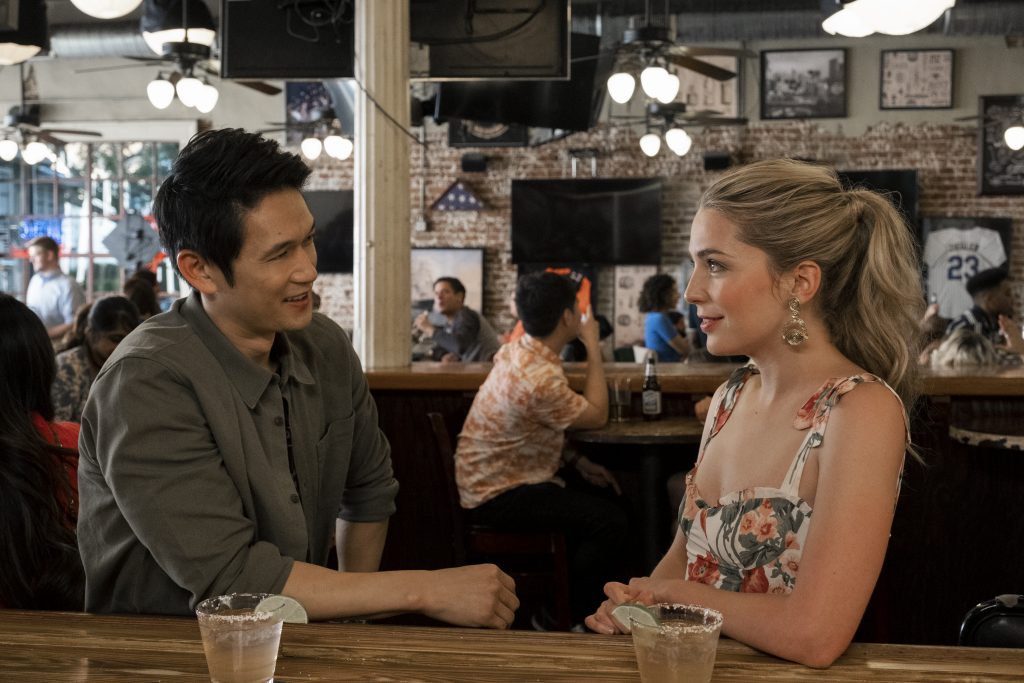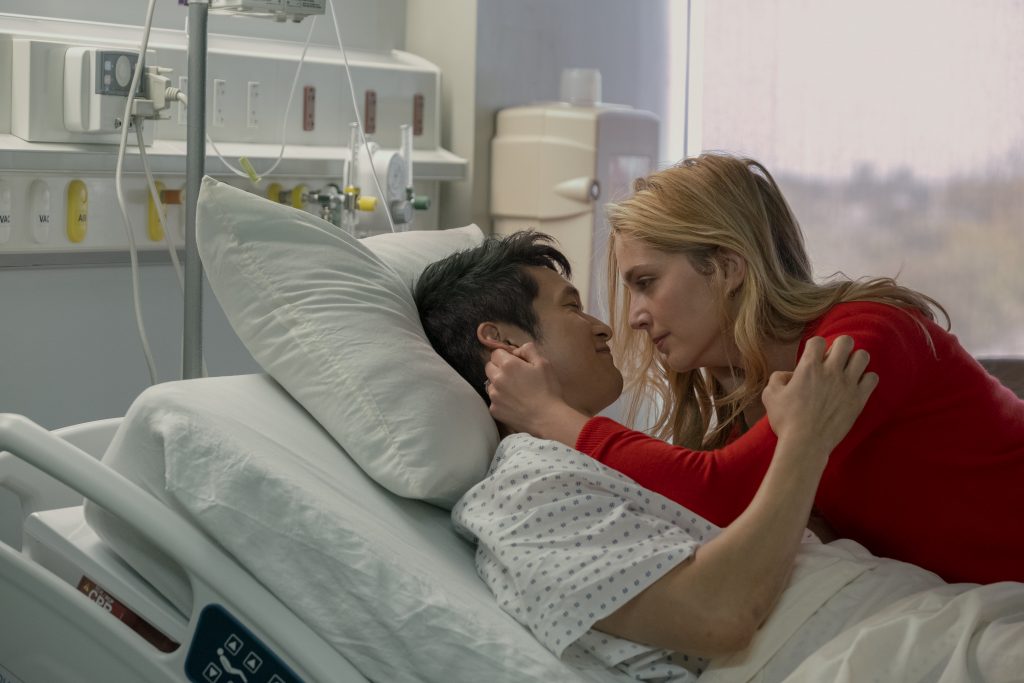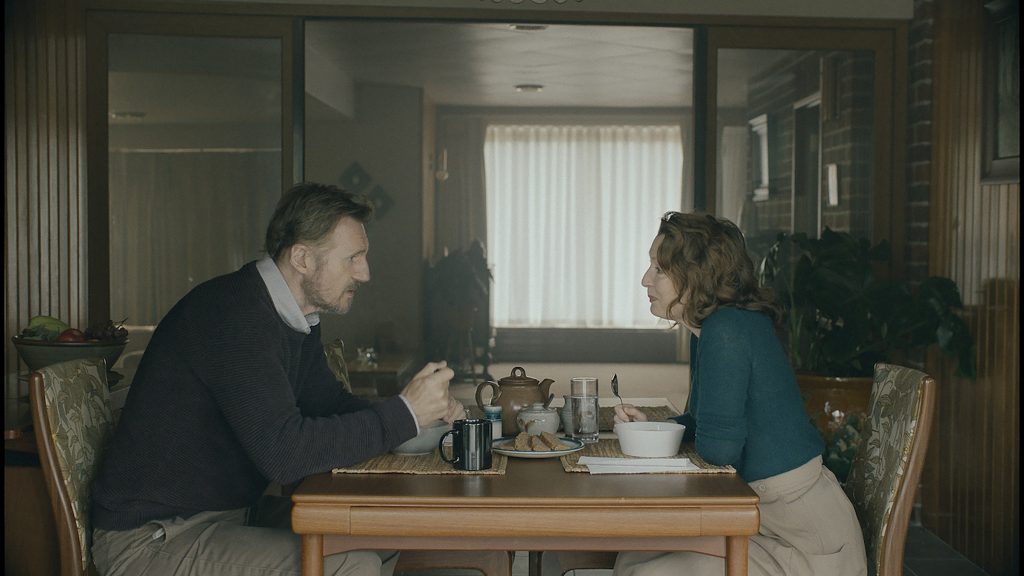
Directed by Marc Meyers
Culture Representation: Taking place in New Orleans, the dramatic film “All My Life” features a predominantly white cast (with some Asians, Latinos and African Americans) representing the middle-class.
Culture Clash: Shortly after getting engaged to be married, a couple experiences a major health crisis that threatens the life of the man in the relationship.
Culture Audience: “All My Life” will appeal primarily to people who like predictable dramas about romances that are plagued by cancer.

The dramatic film “All My Life” (directed by Marc Meyers) is one in a long list of sappy tearjerkers that’s more like a formulaic “disease of the week” movie made for television instead of a well-made cinematic experience that tells a story in a unique way. The city where “All My Life” takes place isn’t mentioned in the story, but the movie was filmed in New Orleans and has some very noticeable New Orleans landmarks. Even though “All My Life” is based on a true story, there’s something very phony and off-putting about this film that some viewers might notice, while others won’t.
If something seems “off” about this movie, that’s because there is something very unbalanced about it: The male partner in the relationship has a family who is never seen or mentioned. In fact, this whole movie seems designed to make the female partner in the relationship look like the well-rounded family person who’s practically saintly during this romance. She plays the role of “emotional rescuer” and “life coach” to her more insecure male partner, whose family background is of no concern to the filmmakers of “All My Life.”
The couple in this relationship happens to be interracial—she’s white and he’s Asian, just like the real-life couple—and their racial identities don’t have be the focal point of the story. But to completely erase any mention of him having a family—especially considering the life-threatening illness he experiences in the story—makes this “romantic” movie feel very one-sided and inauthentic. A culturally tone-deaf film like “All My Life” is one of the reasons why Asians are underrepresented in American-made entertainment.
The screenplay for “All My Life” (written by Todd Rosenberg) is also littered with so many lazy clichés that people who’ve seen enough of these types of hackneyed movies will already know exactly how this story is going to end even before it starts. “All My Life” is told from the perspective of the female protagonist Jennifer “Jenn” Carter (played by Jessica Rothe), which is obvious from the get-go because she’s the narrator in the voiceover that starts off the film. The romance of Jenn Carter and Solomon “Sol” Chau (played by Harry Shum Jr.) is at the center of the story.
At the beginning of the movie, Jenn is portrayed as a bright and energetic woman in her mid-20s who’s got a very busy life where she works and goes to school. But as is usually the narrative in hokey movies like this, her life is supposed to be “empty” until she’s found her one true love. In the voiceover, Jenn says that an average person lives 27,375 days (that’s 75 years, for anyone who doesn’t want to do the math), and she was living a routine life until something major happened to her. “I didn’t notice that my life was becoming a series of forgotten days,” she says in the tone of voice that might as well shout, “My life was boring until I fell in love!”
Jenn and Sol have their “meet cute” moment at a sports bar, where Jenn and her two best friends Amanda Fletcher (played by Chrissie Fit) and Megan Denhoff (played by Marielle Scott) have gone with the intention to just have one drink before heading somewhere else on their evening out. Jenn’s job is vaguely described in the movie (at one point in the story, she mentions to Sol that she works in “decoration”), and the movie never actually shows her working. She’s also studying to get her master’s degree in psychology. There’s a brief scene of her in a classroom.
The details of Amanda’s career are also not revealed, but apparently she works in some type of office job, because Jenn and Megan raise their drinks to her in a congratulatory toast for Amanda getting a promotion and a new assistant. Amanda is the sassiest of the three women, but she and Megan basically have sidekick roles in this story. Megan’s job is never really mentioned, but she seems to be some kind of event planner, because she does all the organizing of Jenn and Sol’s inevitable wedding. Sol and Jenn’s wedding is not a secret plot development, since it’s in shown in this movie’s trailer and other marketing materials for “All My Life.”
Back at the sports bar, the three female friends are immediately noticed by three male friends: Sol, who works in digital marketing; his best pal Dave Berger (played by Jay Pharoah), who’s a professional boxer; and Kyle Campbell (played by Kyle Allen), whose job is not mentioned in the film. The three men (who are all around the same age as the women) make their way over to the women’s table. There’s some mild flirting, but it’s clear that the most romantic sparks are flying between Jenn and Sol. Thankfully, there’s no “triple date” scenario in this movie, where all six of them unrealistically pair up into convenient couples.
Jenn and Sol quickly begin dating each other. For their first date, they go jogging together in a park. Sol has some pain near the right side of his waist, which foreshadows what’s to come later. He assumes it’s just a cramp and doesn’t think much of it, but it happens again later in the film.
Sol and Jenn’s romance is portrayed as very conventional, with a lot of tropes that have been seen before in similar movies: romantic dinners, getting caught in the rain during a date, and the couple having a signature song. For Sol and Jenn, their signature song is the Oasis hit “Don’t Look Back in Anger” (originally released in 1995), which they see a musical string trio perform in the park on their first date, and Sol begins singing along. People who are fans of Shum because of his role in the TV musical series “Glee” will get their big cheesy musical moment later in the movie.
Sol and Jenn eventually become lovers. There are no sex scenes in this very tame movie. Jenn and Sol are a believable couple together, but the way that they are written for this movie, they’re utterly predictable. And because this movie is hell-bent on denying that Sol has a family, his character comes across as someone who only exists to fulfill the romantic fantasies of Jenn. The limited way in which Sol’s character is written is a disservice to the real-life person.
One of the ways that the movie makes Sol a vessel for Jenn’s wish fulfillment is in how she steers him in another career direction. Sol hates his digital-marketing job because he has an overly demanding boss who makes him work long hours that go beyond his job description. Sol’s real passion and talent are in cooking. And he’s very good at it, based on the reactions he gets from people who eat any food that he prepares. But because Jenn is the “emotional rescuer” and “life coach” in this story, she spends a lot of time trying to convince Sol to leave his miserable job and become a restaurant chef.
Jenn’s older cousin Gigi Carter (played by Ever Carradine) conveniently owns a restaurant, and Jenn says that Gigi would love to hire Sol as a sous chef at the restaurant. Sol has some previous experience in food service, since he briefly worked part-time at a food truck. But he’s reluctant to become a full-time chef because he says that he doesn’t have formal training (even though it’s common knowledge that many professional chefs never went to culinary school) and he tells Jenn that he can’t afford to quit his digital-marketing job. As a solution, Jenn suggests that Sol move into her apartment to share expenses.
Sol and Jenn negotiate over their live-in arrangement, such as which types of furniture they will or won’t keep, and who will do the cooking and when. Jenn also tells Sol in a serious tone that she has one major condition of them being committed to living together: “Step up when it’s time to step up. Mistakes I can handle. Regrets I can’t live with.” Sol agrees to the terms that Jenn sets, because this movie is more concerned about Jenn’s thoughts and needs than Sol’s.
At first, things go well for Jenn and Sol. However, Jenn is dismayed that Sol’s office job has been making him so worn-down and exhausted that he seems to have lost interest in cooking. Jenn and Amanda come up with the idea for Sol to cook for the Thanksgiving dinner party that will be held at Sol and Jenn’s place. In addition to Sol and Jenn, the other people at the dinner party are some of their friends, Jen’s single mother Hope Marie Carter (played by Molly Hagen) and Jenn’s cousin Gigi, who owns the restaurant where Jenn thinks Sol should work.
It’s at this dinner where Gigi tastes Sol’s cooking for the first time and basically hires him on the spot. He agrees to work at Gigi’s restaurant as a sous chef. Jenn is thrilled because she knows that she was the driving force behind this life-changing decision for Sol. Because this Thanksgiving dinner party was for family and friends, it’s where observant viewers will really notice the big erasure of Sol’s family in this movie.
Jenn’s mother and cousin are in several scenes with Jenn, and all three of these family members are obviously a support system for each other. Jenn’s father is not seen or mentioned in the story. But what this movie leaves out is any explanation for why Sol’s entire family is never seen or mentioned in the story. Not once does Jenn seem curious about Sol’s family or interested in meeting them. Sol doesn’t mention them either because it’s obviously not in the screenplay.
And although “All My Life” is the type of movie that wants to be “color blind” by not mentioning anyone’s race, it actually seems racist to portray the Asian person in this couple as the one who doesn’t deserve to have any family background whatsoever. The filmmakers obviously didn’t want to cast any additional Asian people as Sol’s family members, but it wouldn’t have been so hard to at least mention why Sol doesn’t have family members to support him during his health crisis. Needless to say, there’s no mention of Sol having family members at his wedding either.
However, the movie does want to get some mileage out of Shum’s “Glee” fame, because Sol’s marriage proposal is an overblown musical scene right out of something that would be in “Glee.” At the same park where Sol and Jenn had their first date, Sol stages an elaborate presentation where he, all of their friends, that same musical string trio that Jen and Sol saw on their first date, as well several people who have never been seen before in the story, perform and sing “Don’t Look Back in Anger” to Jen. The proposal happens near a lake, so some people arrive by boat for this big musical number. Some anonymous spectators are part of this musical number too. It’s as cringeworthy and unrealistic as it sounds.
By the way, Keala Settle (of “The Greatest Showman” fame) has a small role as Viv Lawrence, who works at a vintage shop that sells clothing and some vinyl records. Sol goes in the store one day to look for a gift for Jenn. As he sifts through the crates of vinyl records, Viv recommends anything by Pat Benatar.
Viv tells Sol that Viv used to work in a nightclub where every time a band played the Pat Benatar song “Hit Me With Your Best Shot,” the crowd loved it. As soon as Viv says that, you know what’s coming later in the movie. And it does: Viv sings “Hit Me With Your Best Shot” at Sol and Jenn’s wedding.
Before the wedding happens, there’s a lot of turmoil because of the health crisis. Shortly after getting engaged, Sol wakes up drenched in sweat. He’s taken to a hospital and gets a diagnosis from his doctor Alan Mendolson (played by Dan Butler), who tells Sol and Jenn that Sol has a perforated ulcer. But then, the doctor breaks some news that’s much worse. Actually, its not a perforated ulcer. Sol has a cancerous tumor on his liver.
After surgery, Sol and Jenn are told (much to their great relief) that Sol is on track to make a full recovery. They want to get married in a back-patio area at Gigi’s restaurant, but event planner Megan thinks that this space is too small and not upscale enough. The debate over where Sol and Jenn will have their wedding becomes trivial when they get more bad news: Sol’s liver cancer has returned with vengeance. He’s given only six months to live.
When he was initially diagnosed, Sol told Jenn that if he ever gets a medical diagnosis that’s terminal, they should get a dog together. Jenn finds out that Sol’s medical condition has gotten worse when she comes home one day and sees that he’s gotten a dog, which he’s named Otis. Sol gives her the details of his terminal diagnosis.
Sol and Jenn are devastated, of course, and Sol eventually wants to cancel the wedding. Jenn disagrees and thinks that Sol is giving up too easily. Amanda and Megan come up with the idea to start a GoFundMe campaign to raise $20,000 for Sol and Jenn’s wedding and honeymoon. Amanda and Megan insist on it, and Sol and Jenn agree to this plan.
Mario Cantone has a small role in the movie as Jerome Patterson, the flamboyant manager of the sought-after venue that ends up being rented for the wedding ceremony and reception. Conveniently, there’s a sudden cancellation that allows Sol and Jenn to book the venue on very short notice. They plan to have their honeymoon in an unnamed tropical location that has all the characteristics of a dream vacation, including staying at an upscale beachside resort.
As the story goes on, Jenn is portrayed as someone who doesn’t seem to have any real flaws. Jenn has vulnerabilities (which are not the same as flaws), because there are the inevitable scenes where she wails and cries during the health crisis that shakes this fairytale romance to its core. At the same time, Jenn is portrayed as being the more “motivated” partner in the relationship. She’s the one who gives the pep talks for Sol to change careers and when Sol inevitably becomes pessimistic about his cancer.
Sol’s reaction plays into fairytale stereotypes that men are supposed to be stoic and not cry when they’re faced with having a terminal disease where there’s a high probability that they will die a very slow and painful death. But Sol, the sensitive romantic who pours out his emotions during an elaborate marriage proposal, never shows the emotional vulnerability of crying about his cancer. The most that he does is complain about all the side effects he gets from his cancer treatment. Of course, there isn’t one way that people are supposed to emotionally react to a cancer diagnosis, so Saul’s macho “I’m not going to cry” reaction shouldn’t be judged too harshly.
The movie depicts Jenn as vacillating between trying to lift Sol’s spirits and expecting him to coddle her when she wants to equate his pain with her pain. At one point in the movie, when Sol explains to Jenn that he can’t really think about anything except his cancer treatment’s painful side effects that he’s experiencing at that moment, Jenn makes a scolding remark along the lines of “We’re in this together!” It comes across as a bit insensitive on Jenn’s part, because Jenn’s not the one going through the physical trauma of cancer and the nauseating side effects of cancer treatment.
Although this movie doesn’t show Sol expressing any deep fear and gut-wrenching sadness (Jenn is the one who has the emotional meltdowns), there’s something that does ring true when it comes to some male emotional vulnerability shown in the story. Sol’s friend Kyle is somewhat of a generic character until it’s revealed that Kyle’s father died of a terminal illness. Sol’s diagnosis has triggered Kyle into having bad memories of watching his father slowly die, especially when Kyle goes to the hospital to visit Sol.
And the only way that Kyle knows how to cope is to start avoiding Sol, which he does for the majority of Sol’s cancer treatment. Kyle’s reaction is explained as being similar to having post-traumatic stress disorder. And it’s bad enough where Kyle doesn’t even want to be one of Sol’s groomsmen, although Kyle is still invited to the wedding. The movie shows whether or not Kyle will end up going to the wedding.
“All My Life” is supposed to be a romantic movie about a young and modern couple who go through a lot of turmoil leading up to their dream wedding, but there are some old-fashioned and backwards mindsets that stink up this movie, beginning with the erasure of the groom’s Asian family. There are also some sexist ways in how the gender roles for the couple are framed in the movie. Jenn’s career is barely given a thought, while there are plenty of scenes of Sol at work and a lot of emphasis on how his career is going.
After Jenn meets Sol, her scenes are almost always about the energy she puts into the relationship with Sol. It’s a very big gender imbalance in how these two people are portrayed, which is made all the more noticeable because Jenn doesn’t want to be a full-time homemaker. Yet her career goals are buried in the story, and she spends more time trying to help Sol in his career. It’s really the filmmakers’ way of saying that they don’t think Jenn’s career is as important as Sol’s.
Although the character of Jenn is supposed to have many melodramatic emotions in this movie, Rothe is very good at not going too over the top into campy territory. Her acting skills make the mushiness in the screenplay more tolerable than it should be. Shum is more hampered with playing a stilted character who has no backstory or fascinating character development, so there isn’t really anything he can do but play a character whose disease is often used as a stand-in for his personality.
Aside from erasing Sol’s family and erasing any depiction of Jenn actually working at a job that helps pay her bills, another omission that makes “All My Life” look very fake is that Jenn and Sol never talk about whether or not they want to have kids. Sol’s cancer diagnosis would definitely affect any family planning they might or nor might not have, but that’s an issue that’s unrealistically left out of the movie. Maybe it’s because if Jenn and Sol talked about having children, then it would remind viewers that Sol and Jenn’s kids would be biracial, and it would be more of a reason for people to notice that Sol’s family isn’t in this story.
“All My Life” is the type of movie that looks like it’s not worth paying extra money as a rental or a purchase but instead belongs on the Hallmark Channel or as part of a Netflix subscription. The cast members are serviceable in their acting roles, but the screenplay and direction are utterly in “hack” territory. Worst of all, the filmmakers went out of their way to erase some very realistic and interesting aspects of this real-life romance that could have made this movie stand out from all the “disease of the week” movies that are just like it.
Universal Pictures released “All My Life” in U.S. cinemas on December 4, 2020. The movie’s VOD release date is December 23, 2020.



